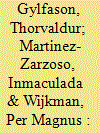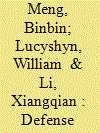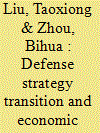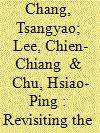|
|
|
Sort Order |
|
|
|
Items / Page
|
|
|
|
|
|
|
| Srl | Item |
| 1 |
ID:
137929


|
|
|
|
|
| Summary/Abstract |
Using a panel gravity model of trade for the period 1995–2010, this paper estimates the potential for increased intra-regional trade among 10 countries of the southern and eastern Mediterranean coast. It examines how closer integration through the EU’s revised neighborhood policy can encourage democratisation and conflict resolution. The main results indicate that while the gains realized to date from regional integration have been small, significant potential gains from deep integration exist. The paper proposes that the EU starts by negotiating deep and comprehensive free trade agreements with Egypt, Israel and Jordan provided these countries also negotiate them with each other.
|
|
|
|
|
|
|
|
|
|
|
|
|
|
|
|
| 2 |
ID:
137933


|
|
|
|
|
| Summary/Abstract |
There are conflicting views as to the relationship between a nation’s defense expenditure (DE) and its population’s income inequality (INEQ). DE, always an important part of government budget, can easily crowd out transfer payments, necessary to improve INEQ; however, these payments may also create a demand that may raise the income levels of the lower income earners. Consequently, the relationship between DE and INEQ is an important question. This paper examines the relationship between DE and INEQ in China for the period of 1989–2012. Utilizing basic cointegration and causality tests, our objective is to add to the literature by providing evidence that China’s DE, in fact, do have an impact on INEQ.
|
|
|
|
|
|
|
|
|
|
|
|
|
|
|
|
| 3 |
ID:
137931


|
|
|
|
|
| Summary/Abstract |
This paper develops a growth model for a country under a Hobbesian environment with international conflicts where national defense is the only way to prevent external predation. Different defense strategies result in different growth paths. The long-run growth path is determined by the equilibrium of a dynamic game with three players: the external predator, the government, and the family. The equilibrium growth path can have different phases: submissive equilibrium, tolerant equilibrium, and complete protection equilibrium. Sustainable growth will endogenously induce an adjustment of the defense strategies. As the economy keeps growing, complete protection will eventually be preferred. The optimal growth path prefers to compress the length of the transitional period between incomplete protection and complete protection. Some interesting features of the transitional dynamics are exhibited by a control model with discontinuity.
|
|
|
|
|
|
|
|
|
|
|
|
|
|
|
|
| 4 |
ID:
137930


|
|
|
|
|
| Summary/Abstract |
This paper examines the impact of military expenditure on stock market development in 36 countries over the period 1989–2010. Within a panel framework, the system GMM estimates is utilised to test the relationship with an array of control variables. We augment the traditional measure of military expenditure–military burden, with a newly constructed comprehensive index – Global Militarisation Index. Overall, the results show that military spending has a negative and significant effect on stock market performance in the selected countries.
|
|
|
|
|
|
|
|
|
|
|
|
|
|
|
|
| 5 |
ID:
137932


|
|
|
|
|
| Summary/Abstract |
This paper re-examines the long-run causal relationship between military expenditure and economic growth in China over the period 1952–2010. An empirical econometric analysis based on a Barro-style growth model is conducted. By employing the Bartlett corrected trace test, which provides better approximations of the finite sample distribution to determine the rank of cointegration, the results support the existence of a single long-run equilibrium relationship between the variables. Furthermore, it is confirmed that the cumulated shocks of military expenditure primarily originate from different components of shocks that relate to economic development rather than the other way round.
|
|
|
|
|
|
|
|
|
|
|
|
|
|
|
|
| 6 |
ID:
137934


|
|
|
|
|
| Summary/Abstract |
This study revisits the long run and dynamic causal linkages between defense spending and economic growth in 15 selected European countries for the period 1988–2010 by utilizing recent developments in non-stationary panel data analysis. To this end, the series properties of per capita defense spending, per capita real capital stocks, and per capita real GDP are investigated by the panel unit root tests with and without breaks that support evidence on unit root. The panel cointegration tests with and without breaks are also subsequently employed to investigate whether there exists a long-run equilibrium relationship between these three variables. Finally, our causality analysis from panel vector error-correction model suggests that there is a feedback relation between real capital stock and real GDP in both short and long run, a one-way Granger causality running from real GDP to defense spending in both short and long run, and defense spending only Granger causes real capital stock in the long run.
|
|
|
|
|
|
|
|
|
|
|
|
|
|
|
|
|
|
|
|
|